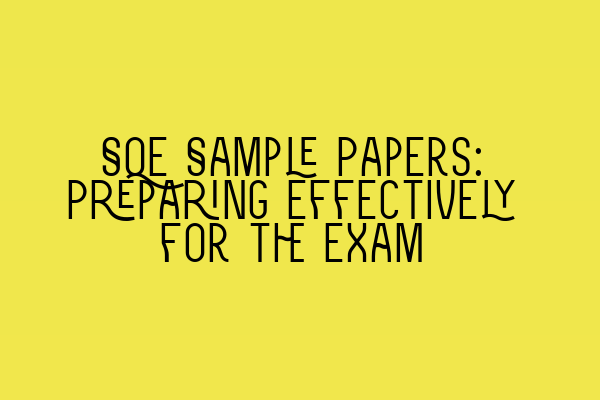SQE Sample Papers: Preparing Effectively for the Exam
Are you preparing for the Solicitors Qualifying Examination (SQE)? As an aspiring solicitor, it is crucial to have a comprehensive understanding of the exam format, content, and structure. One of the most effective ways to familiarize yourself with the exam is by practicing with sample papers. In this blog post, we will explore the importance of SQE sample papers and provide you with tips on how to prepare effectively for the exam.
Understanding the SQE Exam
Before we delve into the benefits of using sample papers, let’s quickly overview the SQE exam. The SQE is a two-part assessment that is designed to evaluate your competence and practical skills as a solicitor. It replaces the previous Qualified Lawyers Transfer Scheme (QLTS) and is a mandatory requirement for all aspiring solicitors in England and Wales.
The first part of the SQE consists of two written exams, also known as SQE1. These exams focus on the functioning of legal systems, the foundational law, and legal research and writing skills. The second part, SQE2, evaluates your practical legal skills through various tasks, including client interviewing, advocacy, and case analysis.
The Role of SQE Sample Papers
SQE sample papers play a crucial role in your preparation for the exam. They provide you with a realistic preview of the actual exam format, allowing you to familiarize yourself with the types of questions that may be asked and the time constraints you will face. By practicing with sample papers, you can improve your time management skills and develop strategies for answering different question types effectively.
Not only do sample papers help you become familiar with the exam structure, but they also allow you to assess your knowledge and identify areas for improvement. By reviewing your performance in the practice tests, you can pinpoint the topics that require further study and allocate your revision time accordingly.
Tips for Effective Preparation
Now that we understand the significance of SQE sample papers, let’s explore some tips to help you prepare effectively for the exam:
- 1. Start Early: Begin practicing with sample papers as early as possible to give yourself ample time to identify weaknesses and improve your knowledge.
- 2. Set Realistic Targets: Create a study schedule and set targets for completing practice papers. This will help you stay disciplined and focused throughout your preparation.
- 3. Analyze Your Performance: After completing each practice paper, thoroughly review your answers and understand the reasoning behind the correct responses. This will enhance your understanding of the subject matter.
- 4. Focus on Weak Areas: Identify the subjects or topics in which you struggle the most and allocate more time to revise and practice questions related to these areas.
- 5. Simulate Exam Conditions: When practicing with sample papers, try to simulate exam conditions as closely as possible. This includes timing yourself and avoiding distractions to mimic the actual exam environment.
- 6. Seek Feedback: Consider seeking feedback from qualified professionals or tutors who can provide valuable insights and suggestions for improvement.
To further enhance your understanding of property law, commercial leases, tenant rights, and property transactions, we recommend checking out these related articles:
– Joint Ownership: Legal Considerations for Co-Owners of Property
– Commercial Leases: Essential Insights for Business Premises
– Tenant Rights in the UK: Understanding Your Legal Protections
– Property Transactions and the Legal Process: A Comprehensive Guide
– Mortgages and Land Law: Essential Knowledge for Property Practitioners
Conclusion
In conclusion, preparing effectively for the SQE exam involves utilizing sample papers to improve your knowledge, understand the exam structure, and practice under timed conditions. By incorporating these tips into your study routine and actively engaging with SQE sample papers, you will be better equipped to ace the exam and embark on a successful career as a solicitor. Good luck!

Leave a Reply